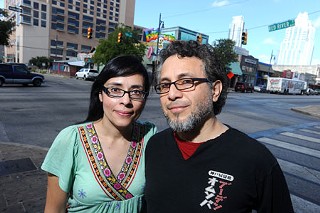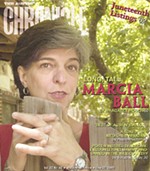Rock, Then Surf, en Español
Austin-based tastemaking website La Banda Elástica puts the emphasis on worldwide
By Belinda Acosta, Fri., Aug. 13, 2010
Music – some might specify rock & roll – is the one language that knocks down borders, real or imagined, creating a space in which people who speak various languages and hail from various worlds and cultures can come together. You may not understand the lyrics, you may not even understand the aesthetic, but music, when it speaks to you, does so loud and clear.
Finding the music that rocks your world is easier these days. Independent artists and even established artists are going rogue, distributing their music directly to listeners through websites, downloadable MP3s, flash-drive giveaways, and other means. It didn't use to be that way. It used to be that labels and AM, and then FM radio pretty much dictated what listeners would hear. That, along with a few music publications and music critics, served as the arbiter of taste for the unschooled masses. So what was a struggling rock musician with not too much money but a whole lot of determination to do to get some attention? If you were Emilio Morales circa 20 years ago, you got out your pen, became friendly with the folks at the photocopy store, and got down to work.
"The L.A. Times or La Opinión, they didn't care about us," Morales said about his band Maria Fatal, for which he was a songwriter and guitarist. At the time, Morales was living in the L.A area after relocating with his parents from Mexico as a young adult. Like many young people, he found life in music. And like the many kids and musicians he knew, he was a young Latino whose first language was Spanish. He was immersed in U.S. culture and listened to music with a bilingual and bicultural ear. It was difficult enough for an independent artist to get any attention from the mainstream press, but a small, rock en español band? Forget it. That void in representation was what launched La Banda Elástica in 1992, when Morales added writer/editor/designer/publisher to his list of accomplishments.
Starting out as a four-page, photocopied newsletter, the publication gave information about upcoming gigs by new bands, short CD reviews, shout-outs, and other information of interest to the burgeoning rock en español audience. Morales remembers taking armfuls of the then-modest publication to gigs and handing them out between sets. Before long, other indie and rock en español bands, liking the format and the cause, contacted him and asked for copies they could distribute at their gigs. The word was out.
By its third anniversary in 1995, the look of La Banda Elástica had changed dramatically. It had slick, color covers; ad support; and a stable of contributors – including Guadalajara-based music and culture writer Enrique Blanc, who served for a time as editor-in-chief but now serves in a mentorship capacity as well as doing some writing. By 2001, it was a true magazine – a four-color glossy with great art, stories, and interviews with the likes of Los Tigres de Norte and Lila Downs, in addition to film and concert coverage and, most importantly, reports on music scenes by writers in Argentina, Colombia, Puerto Rico, the U.S., and other parts of Latin America.
"The thing that set us apart," explained Maria Madrigal, Morales' partner inside and outside the publication and now in charge of marketing and promotion for La Banda Elástica, "is that we were focusing back. Other music publications, even ones that were covering Latino music, were still putting Anglos on their covers or only featuring U.S. artists. We wanted to cover music from all sides, ignoring the borders. We found our niche."
After 10 years of "stretching beyond the conventional," La Banda Elástica made another big leap. They dropped their print edition to become a totally online publication. Ceasing print production is still seen as something of a loss for those still moored to the print world. But Morales and Madrigal do not see it that way.
"We embraced technology," Morales said. "In the beginning, [Internet] speeds were slow, but things have improved so much in just 15 years," he marveled. "But even back then, we just knew this was going to work for us, that the Internet would be what it is now, and we went with it."
Morales and Madrigal are clearly not afraid of change. In fact, they seem to thrive on it – a big plus given the still-changing media landscape. Two years ago, they decided to relocate to Austin, drawn by the cost of living, the music scene in general, and the Latino music scene in particular, not to mention the existing tech culture. Now settled, La Banda Elástica has gone through another big change, making adjustments in infrastructure behind the scenes and pumping up what viewers see on their computer screens when they go to www.labandaelastica.com.
"We're working to make the site more interactive for users," Morales explained. (The official launch of the new site occurred Aug. 2, but there were still a few kinks to work out at press time.) In addition to cosmetic changes, the interactivity will include free downloads of music from independent artists and a radio feature for visitors to discover new music they might not hear from conventional sources. Music videos, interviews with artists, and other performance features will help give visitors an earful, instead of just an eyeful, of text that may or may not fully convey the music being described, a big plus when talking about largely unknown indie bands. While La Banda Elástica has three full-time staff writers and numerous freelancers, they've decided to break from the tradition of having an all-knowing critic dispense information and evaluation about new artists' concerts or CDs, turning instead to bloggers.
"The age of the expert is gone," Morales said flatly. "The kids who blog for us are music lovers in all aspects, all genres, all ages. The bloggers write from their heart, what they feel. Their pieces are shorter and not as intellectually driven as [traditional] critics' essays. [Our bloggers] are more interested in passing and sharing their experience of the music, and we think readers respond strongly to that."
While La Banda Elástica is largely in Spanish, other experiments in the works include inviting artists as guest bloggers and a project tentatively called "one subject, two writers." In this, one subject or artist will be written about by a writer in English, another writer in Spanish. "We think that you'll get something if you only read one language but a fuller experience if you read both, as many of our readers do," Madrigal explained.
Morales and Madrigal's approach to keeping La Banda Elástica viable seems to be not to get too comfortable with routine or too committed to what works. Their approach seems to be working, at least as far as advertisers are concerned. They still have the support of high-profile advertisers, and their expertise was recently sought by cable net-let Discovery en Español to help target what's new and cutting edge in Latino music and culture for a microsite the network will carry on its website and possibly on air. The unnamed project was filmed in July and featured five young people traveling from the northern point of the Americas (Alaska) down to South American (ending in Argentina). Along the way, they stopped in 10 cities to experience Latino life and culture and report on it. Austin was a stopping point in July. The microseries is set to air sometime in September.
The media climate may continue to shift, bands may come and go, phenoms may flash and burn, but the one thing that never changes is La Banda Elástica's mission.
"Our first goal is to celebrate new music and new artists, not the dinosaurs," Morales said, recalling La Banda Elástica's first and primary mission. Although a bit of gray winks from his dark curls, Morales is not ready to put up his feet and bide his time. "We want to look toward the future, keep track of movements," he said. "What youth have shown me is that things are possible if you look at the world in a different way."












